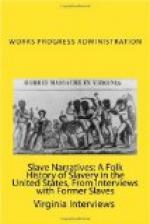“Den we go trainin’ in d’ camp and we move on. Come to a little town ... a little town. We come to Bolling Green ... den to Louiville. We come to a rivah ... a rivah (painfully recalling) d’ Mississippi.
“We weah ’nfantry and petty soon we gits in plenty fights, but not a scratch hit me. We chase dem cavalry. We run dem all night and next mohnin’ d’ Captain he say, ‘Dey done broke down.’ When we rest, he say ‘See dey don’ trick you.’ I say, ‘We got all d’ ahmy men togedder. We hold dem back ’til help come.’
“We don’ have no tents. Sleep on naked groun’ in wet and cold and rain. Mos’ d’ time we’s hungry but we win d’ war and Mahstah Eubanks tell us we no moah hisn property, we’s free now.”
The old man can talk only in short sentences and his voice dies to a whisper and soon the strain became evident. He was tired. What he does remember is with surprising clearness especially small details, but with a helpless gesture, he dismisses names and locations. He remembers the exact date of his discharge, March 20, 1866, which his daughter verified by producing his discharge papers. He remembers the place, Vicksburg, the Company—K, and the Regiment, 180th. Dropping back once more to his childhood he spoke of an incident which his daughter says makes them all cry when he relates it, although they have heard it many times.
“Mahstah Everett whipt me onct and mothah she cried. Then Mahstah Everett say, ’Why yoh all cry?—Yoh cry I whip anothah of these young uns. She try to stop. He whipt ’nother. He say, ‘Ifn yoh all don’ stop, yoh be whipt too!’ and mothah she trien to stop but teahs roll out, so Mahstah Everett whip her too.




